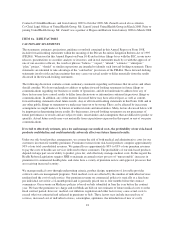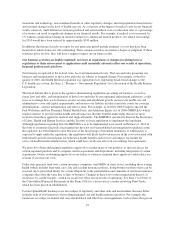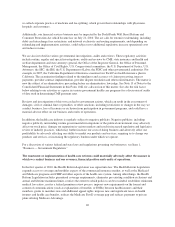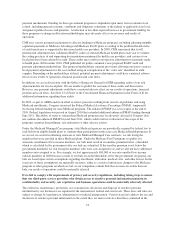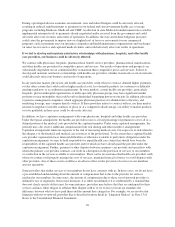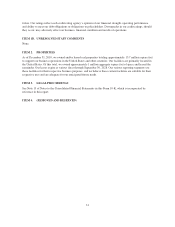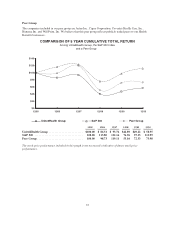United Healthcare 2010 Annual Report Download - page 28
Download and view the complete annual report
Please find page 28 of the 2010 United Healthcare annual report below. You can navigate through the pages in the report by either clicking on the pages listed below, or by using the keyword search tool below to find specific information within the annual report.During a prolonged adverse economic environment, state and federal budgets could be adversely affected,
resulting in reduced reimbursements or payments in our federal and state government health care coverage
programs, including Medicare, Medicaid and CHIP. A reduction in state Medicaid reimbursement rates could be
implemented retrospectively to payments already negotiated and/or received from the government and could
adversely affect our revenues and results of operations. In addition, the state and federal budgetary pressures
could cause the government to impose new or a higher level of taxes or assessments for our commercial
programs, such as premium taxes on insurance companies and health maintenance organizations and surcharges
on select fee-for-service and capitated medical claims, and could adversely affect our results of operations.
If we fail to develop and maintain satisfactory relationships with physicians, hospitals, and other health
care providers, our business could be adversely affected.
We contract with physicians, hospitals, pharmaceutical benefit service providers, pharmaceutical manufacturers,
and other health care providers for competitive prices and services. Our results of operations and prospects are
substantially dependent on our continued ability to maintain these competitive prices and services. Failure to
develop and maintain satisfactory relationships with health care providers, whether in-network or out-of-network,
could adversely affect our business and results of operations.
In any particular market, physicians and health care providers could refuse to contract, demand higher payments,
or take other actions that could result in higher medical costs, less desirable products for customers or difficulty
meeting regulatory or accreditation requirements. In some markets, certain health care providers, particularly
hospitals, physician/hospital organizations or multi-specialty physician groups, may have significant market
positions or near monopolies that could result in diminished bargaining power on our part. In addition, physician
or practice management companies, which aggregate physician practices for administrative efficiency and
marketing leverage, may compete directly with us. If these providers refuse to contract with us, use their market
position to negotiate favorable contracts or place us at a competitive disadvantage, our ability to market products
or to be profitable in those areas could be adversely affected.
In addition, we have capitation arrangements with some physicians, hospitals and other health care providers.
Under the typical arrangement, the health care provider receives a fixed percentage of premium to cover all or a
defined portion of the medical costs provided to the capitated member. Under some capitated arrangements, the
provider may also receive additional compensation from risk sharing and other incentive arrangements.
Capitation arrangements limit our exposure to the risk of increasing medical costs, but expose us to risk related to
the adequacy of the financial and medical care resources of the professional. To the extent that a capitated health
care provider organization faces financial difficulties or otherwise is unable to perform its obligations under the
capitation arrangement, we may be held responsible for unpaid health care claims that should have been the
responsibility of the capitated health care provider and for which we have already paid the provider under the
capitation arrangement. Further, payment or other disputes between a primary care provider and specialists with
whom the primary care provider contracts can result in a disruption in the provision of services to our members
or a reduction in the services available to our members. There can be no assurance that health care providers with
whom we contract will properly manage the costs of services, maintain financial solvency or avoid disputes with
other providers. Any of these events could have an adverse effect on the provision of services to our members
and our operations.
Some providers that render services to our members do not have contracts with us. In those cases, we do not have
a pre-established understanding about the amount of compensation that is due to the provider for services
rendered to our members. In some states, the amount of compensation due to these out-of-network providers is
defined by law or regulation, but in most instances, it is either not defined or it is established by a standard that
does not clearly specify dollar terms. In some instances, providers may believe that they are underpaid for their
services and may either litigate or arbitrate their dispute with us or try to recover from our members the
difference between what we have paid them and the amount they charged us. For example, we are involved in
litigation with out-of-network providers that is described in more detail in “Litigation Matters” in Note 13 of
Notes to the Consolidated Financial Statements.
26




